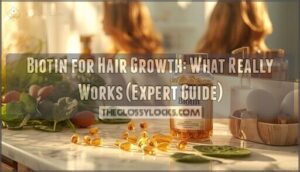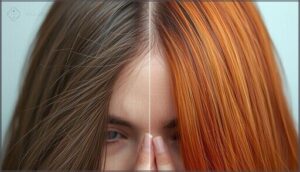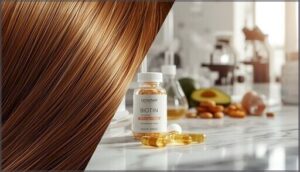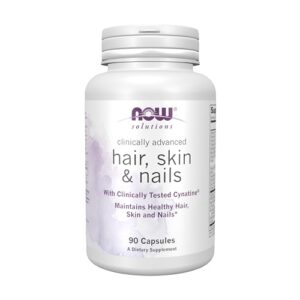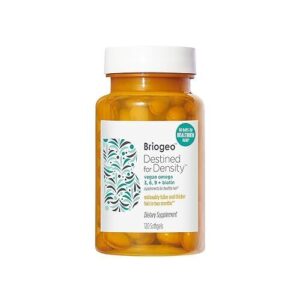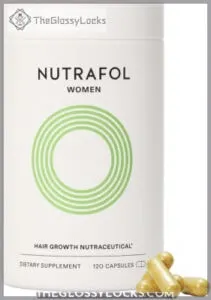This site is supported by our readers. We may earn a commission, at no cost to you, if you purchase through links.
Your bathroom cabinet might be full of expensive hair serums and treatments, but a $10 bottle of biotin could outperform them all—if you’re one of the people who actually needs it. Here’s the catch: biotin for hair growth works brilliantly when you’re deficient, and does practically nothing if you’re not. Most people don’t know which camp they fall into.
As a dermatologist, I’ve watched patients spend hundreds on biotin supplements with zero results, while others see dramatic improvements in hair thickness within weeks. The difference comes down to understanding what biotin actually does in your body, recognizing genuine deficiency symptoms, and knowing the right dosage that separates evidence from marketing hype.
Table Of Contents
- Key Takeaways
- What is Biotin and Why is It Important?
- How Biotin Supports Hair Growth
- Signs and Causes of Biotin Deficiency
- Does Biotin Really Work for Hair Growth?
- Safe Biotin Intake and Supplementation
- Best Food Sources of Biotin
- Top Biotin Supplements for Hair Growth
- Frequently Asked Questions (FAQs)
- What are the potential side effects of taking biotin supplements?
- Are there any specific foods that are high in biotin?
- Can biotin reverse genetic or hereditary hair loss?
- How long after stopping biotin do benefits fade?
- Does biotin interact with medications or other supplements?
- Can children or teens safely take biotin supplements?
- Is topical biotin effective compared to oral supplements?
- Conclusion
Key Takeaways
- Biotin only works for hair growth if you’re actually deficient (less than 0.1% of people)—healthy individuals see zero results from supplements despite marketing claims.
- True biotin deficiency shows up as hair thinning, brittle nails, and skin dryness around your eyes and mouth, often caused by specific medications, genetic conditions, or malabsorption issues.
- Most adults get enough biotin from foods like eggs, nuts, and legumes (30 micrograms daily), making supplements unnecessary unless blood work confirms a deficiency.
- High-dose biotin supplements (5,000+ micrograms) can interfere with lab tests for thyroid and hormone levels, creating false readings that complicate medical diagnosis.
What is Biotin and Why is It Important?
You’ve probably seen biotin everywhere—from hair growth ads to supplement shelves—but what exactly is it? Before you can decide if biotin actually works for your hair, you need to understand what it is and why your body needs it.
Let’s break down the basics so you can make informed decisions about your hair health.
Biotin as Vitamin B7
You’ve probably heard biotin called vitamin B7—but what’s actually happening inside your body when you take it? This water-soluble vitamin acts as a coenzyme for carboxylase enzymes, the workhorses behind your metabolism. Here’s what biotin does for you:
If you’re curious whether this metabolic boost translates to facial hair benefits, here’s what the research says about biotin and beard growth.
- Powers fatty acid synthesis and glucose metabolism
- Aids amino acid breakdown for energy production
- Gets transported through your bloodstream by carrier proteins
- Attaches to enzymes that keep cells functioning properly
Your gut bacteria produce some biotin naturally, though dietary sources and biotin supplements remain your primary supply for aiding hair growth and overall health. Understanding the importance of scientific study summaries can help you make informed decisions about your health and wellness.
Biotin’s Role in Hair, Skin, and Nail Health
Biotin plays a crucial role in maintaining the structure of keratin filaments, the protein scaffolding that gives hair its strength. It also promotes normal nail growth, reduces brittleness, and bolsters skin barrier function through lipid synthesis.
| Body Part | Biotin’s Action | Visible Result |
|---|---|---|
| Hair | Supports keratin structure | Reduced breakage |
| Nails | Enhances growth cycles | Less splitting |
| Skin | Strengthens lipid barrier | Improved texture |
| Overall | Metabolizes nutrients | Better cell function |
Maintaining sufficient biotin levels is essential for hair strengthening, but it is just one piece of the puzzle. Exploring the science behind biotin’s role in hair growth can be further aided by understanding dictionary definitions.
How The Body Obtains and Uses Biotin
Your body doesn’t just passively receive biotin—it actively handles every molecule. Understanding this process reveals why some people respond better to biotin supplements than others.
Factors like gut health, metabolic rate, and existing nutrient deficiencies all influence how long biotin takes to work in your system.
Here’s what happens when biotin enters your system:
- Biotin absorption occurs in your small intestine through specialized carrier proteins that shuttle it into your bloodstream
- Biotin transport relies on albumin binding to deliver it to hair follicles, skin cells, and other tissues hungry for this nutrient
- Liver function recycles biotin through biotinidase enzymes, extracting and reusing it from proteins your body breaks down
- Kidney reabsorption captures biotin before it’s lost in urine, maintaining steady levels even when dietary intake fluctuates
This intricate biotin metabolism system explains why deficiency is rare in healthy adults eating biotin-rich foods. Your liver constantly recycles what you already have, and your kidneys prevent waste.
How Biotin Supports Hair Growth
You’ve heard biotin can help your hair, but how does it actually work? The truth is, biotin doesn’t grow new hair from scratch—it nourishes the hair you already have in three specific ways.
It strengthens strands, reduces breakage, and adds a fuller appearance—especially helpful if you’re using lightweight styling products for fine hair that won’t weigh down your look.
Let’s break down what’s really happening beneath your scalp.
Biotin’s Impact on Keratin and Hair Structure
Think of your hair shaft like a rope made of protein strands—that’s keratin. Biotin fuels the enzymes that build this keratin, strengthening each strand from within. When biotin metabolism runs smoothly in your hair follicle, keratin production stays strong, reducing hair breakage markedly.
Without enough biotin, keratin strength falters, making hair brittle and prone to snapping. Biotin supplements restore this structural integrity, but only if you’re actually deficient.
Most people get plenty of biotin from foods like eggs, nuts, and seeds, so supplements for healthy hair growth work best when a blood test confirms low levels.
Mechanisms of Hair Strengthening and Breakage Prevention
Resilience matters when you’re fighting breakage. Biotin powers hair strengthening through multiple channels: it fuels lipid production in your scalp environment, creating a protective barrier that shields each strand from friction and heat damage.
Here’s how breakage prevention actually works:
- Biotin aids keratin synthesis by providing building blocks for cysteine-rich proteins
- Enhanced cuticle integrity reduces surface friction during styling
- Improved hair follicle health accelerates repair processes in damaged strands
- Nutrient interactions with zinc and iron boost biotin’s protective effects
- Biotin supplements restore brittle hair rapidly when deficiency exists
Biotin’s Role in Nutrient Metabolism for Hair
Energy production drives everything your follicles do. Biotin metabolism powers three critical carboxylase enzymes that convert food into fuel for hair follicle activity, supporting keratin synthesis through fatty acid pathways and amino acid utilization.
| Metabolic Process | Impact on Hair Growth |
|---|---|
| Acetyl-CoA carboxylase | Links carbohydrate and lipid metabolism in follicle cells |
| Amino acid breakdown | Supplies essential proteins for keratin |
| Mitochondrial function | Energizes hair shaft formation during growth phase |
| Nutrient uptake | Optimizes absorption of building blocks for strands |
Biotin supplements restore these pathways when deficiency throttles hair production.
Signs and Causes of Biotin Deficiency
Your body sends clear signals when biotin levels drop too low. Recognizing these symptoms early helps you address deficiency before it impacts your hair, skin, and overall health.
Let’s break down what to watch for, why deficiency happens, and who needs to stay especially alert.
Common Symptoms Affecting Hair, Nails, and Skin
Your body sends clear distress signals when biotin runs low. Hair thinning and irregular hair shedding appear first, often worsening with stress or seasonal changes. You’ll notice nail brittleness—cracking, splitting, and ridging become frustratingly common.
Skin dryness follows, especially around your eyes, nose, and mouth, sometimes progressing to flaky patches or dermatitis. These interconnected symptoms point directly to biotin deficiency affecting your hair growth, skin health, and overall vitality.
Medical and Lifestyle Causes of Deficiency
Your biotin deficiency doesn’t happen in a vacuum. Medications like anticonvulsants and long-term antibiotics disrupt biotin metabolism, while chronic alcohol consumption blocks absorption and increases urinary loss.
Inflammatory bowel disease and malabsorption syndromes prevent your gut from extracting biotin effectively.
Genetic factors—particularly biotinidase deficiency—impair biotin recycling despite adequate intake.
Recognizing these medical and lifestyle causes helps you address the root vitamin deficiency, not just mask symptoms with biotin supplements.
Who is Most at Risk for Low Biotin?
Certain populations face markedly higher risk factors for biotin deficiency and resulting hair loss. You’re vulnerable if you have biotinidase deficiency—a genetic condition preventing biotin recycling—or struggle with chronic alcoholism that destroys nutrient absorption.
Pregnant and postpartum women experience depleted biotin levels from fetal demands.
Antiseizure medications accelerate vitamin deficiency, making biotin supplements medically necessary to restore biotin benefits and side effects balance.
Does Biotin Really Work for Hair Growth?
You’ve heard the claims, but does biotin actually work? The answer depends on what’s happening with your hair and your body’s baseline biotin levels.
Let’s break down what the research shows, who benefits most, and what you can realistically expect.
Scientific Evidence and Clinical Studies
The truth about biotin and hair growth lives in the data, not the hype. Placebo-controlled clinical trials tell us biotin supplements don’t boost hair density in healthy people. Here’s what evidence-based research methods reveal:
- Randomized study designs show no significant regrowth above dietary intake
- Systematic reviews find zero consistent hair benefits without biotin deficiency
- Data analysis confirms improvements vanish when blinding controls are used
- Biotin benefits surface only when treating documented deficiency
- Most biotin supplements exploit hope, not science
Effectiveness for Deficiency-related Hair Loss
When your body lacks biotin, hair regrowth happens fast once you fix it. Clinical trials show deficiency symptoms—thinning strands, brittle texture—reverse within weeks of biotin therapy.
Less than 0.1% of people face true deficiency, but for them, supplement efficacy is real. Case reports document dramatic hair growth after repletion.
The catch? Serum biotin levels in healthy folks don’t predict hair loss, limiting benefits outside confirmed deficiency.
Results in Healthy Individuals Without Deficiency
Here’s the hard truth: if you don’t have a deficiency, biotin supplements won’t bulk up your hair. Randomized trials using 2.5–5 mg daily show zero gains in hair thickness or regrowth for healthy people.
Without a biotin deficiency, supplements won’t thicken your hair—trials prove healthy people see zero regrowth benefits
Your baseline biotin levels stay flat, meaning no boost to hair density. Supplement safety isn’t the issue—efficacy is.
Save your money unless blood work confirms you’re truly low.
Safe Biotin Intake and Supplementation
You don’t need to guess how much biotin is safe or effective—there are real numbers backed by research. The right dosage depends on whether you’re maintaining basic health or addressing hair concerns specifically.
Here’s what you need to know about daily recommendations, therapeutic doses, and potential risks you can’t ignore.
Recommended Daily Allowances for Adults
Most adults need just 30 micrograms of biotin daily—that’s the official Adequate Intake set by nutrition authorities. European guidelines push it slightly higher to 40 micrograms, reflecting regional dietary patterns.
Here’s what your body actually requires for ideal vitamin B7 support:
- Baseline nutrient balance: 30–100 micrograms from food usually covers daily intake without biotin supplements
- No upper limit exists: Your kidneys flush excess biotin, making supplement safety remarkably forgiving
- Deficiency remains rare: Most balanced diets naturally meet dietary needs for healthy hair function
Dosage Guidelines for Hair Growth
When you’re chasing serious hair growth, most over-the-counter hair supplements deliver 1,000 to 5,000 micrograms (1–5 mg) of vitamin B7 daily—far exceeding baseline needs. Clinical doses for confirmed deficiency can reach 2.5 to 10 milligrams under medical supervision.
Here’s the catch: high doses above 5 mg may skew your lab results. Before jumping into biotin supplementation, talk with your clinician about the right biotin dose for your hair goals.
Safety, Side Effects, and Lab Test Interference
Fortunately, biotin toxicity remains rare—your kidneys flush out excess through urine. That said, supplement safety isn’t absolute. Watch for these side effects and dosage risks:
- Acneiform breakouts on chest or jawline
- Digestive upset: nausea, cramping, diarrhea
- Lab interference distorting thyroid, troponin, and vitamin D results
- Allergic rashes in sensitive individuals
- False-normal readings masking nutrient deficiency
Pause biotin supplements 72 hours before clinical lab work.
Best Food Sources of Biotin
You don’t need to rely solely on supplements to get your biotin fix. Real food sources pack plenty of this vitamin, and they come with other nutrients that support hair health too.
Let’s look at which foods deliver the most biotin, how to work them into your meals, and when supplements might actually make sense.
Biotin-rich Foods for Natural Intake
You don’t need supplements to get your biotin fix. Real food sources deliver this vitamin naturally and efficiently. Eggs pack 10 micrograms per serving, while legumes like peanuts offer up to 2 micrograms per ounce. Nuts, whole grains, and organ meats like liver round out your options.
These biotin-rich foods support nutrient absorption and hair growth when you build them into healthy eating habits and biotin-rich recipes.
Tips for Including Biotin in Your Diet
Start by mapping out weekly meals around biotin-rich foods you actually enjoy. Toss eggs into breakfast, snack on almonds mid-morning, and work legumes into dinner rotations. Dietary planning doesn’t require overhaul—just intentional swaps.
Pair biotin sources with vitamin C to support biotin absorption and nutrient balance. Track dietary changes for hair growth in a simple food diary, adjusting meal preparation as your routine evolves. Consistency beats flawlessness when addressing biotin deficiency.
Comparing Food Sources to Supplements
Typical diets deliver 10–30 micrograms of biotin daily from varied sources, while supplements pack 5,000–10,000 micrograms per dose. Your body manages biotin absorption differently depending on the source—food variety facilitates natural nutrient interactions and dietary balance, whereas supplement safety concerns arise at mega-doses that skew lab results.
For most people, biotin-rich foods and dietary sources outperform biotin supplements in nutrition and hair health without the interference.
Top Biotin Supplements for Hair Growth
You’ve got the diet down, but sometimes food alone won’t cut it. If you’re dealing with hair loss or thinning, targeted supplements can deliver the biotin boost your follicles need without guessing your intake.
Here are three dermatologist-recognized options that combine biotin with complementary nutrients for serious hair support.
1. Now Foods Hair Skin Nails Supplement
Now Foods Hair Skin Nails delivers 5,000 micrograms of biotin per serving—well above the 30-microgram daily need, which means you’re getting serious support for hair growth, skin health, and nail strength.
The formula includes Cynatine HNS, a patented solubilized keratin that reinforces your hair’s structural integrity from within.
This GMP-certified vitamin supplement for hair is budget-friendly and well-tolerated, though high-dose biotin can skew certain lab tests.
| Best For | People looking for an affordable, high-dose biotin supplement to support hair growth, skin elasticity, and nail strength, especially if they suspect a biotin deficiency or want added keratin support. |
|---|---|
| Primary Purpose | Hair, skin & nails |
| Supplement Form | Veg capsules |
| Supply Duration | 30-45 days |
| Key Ingredients | Cynatine keratin |
| Dietary Formula | Vegetarian |
| Target Users | General adult use |
| Additional Features |
|
- Contains 5,000 mcg of biotin per serving plus patented Cynatine HNS keratin for comprehensive hair, skin, and nail support
- GMP-certified and budget-friendly with 90 capsules per bottle for good value
- Generally well-tolerated and water-soluble, making it safe for most people at recommended doses
- High-dose biotin can interfere with lab tests like thyroid panels, potentially causing inaccurate results
- Results vary widely—some users report no improvement in hair or nail health
- May cause stomach upset or sensitivity in some individuals, and effectiveness depends on whether you actually have a biotin deficiency
2. Briogeo Hair Density Supplements
Briogeo Hair Density Supplements blend biotin with botanical extracts and multiple vitamins, targeting nutrient synergy rather than relying on biotin alone. The vegan formulas generally require 90-plus days to show results—hair growth doesn’t happen overnight.
Briogeo ingredients support follicle health and structural integrity, but high biotin dosage can interfere with thyroid tests, so inform your doctor before starting any vitamin supplements for hair.
| Best For | People looking for a vegan hair supplement who are willing to wait 3+ months for results and don’t mind a higher price point for cruelty-free formulas. |
|---|---|
| Primary Purpose | Hair, skin & nails |
| Supplement Form | Softgels |
| Supply Duration | 30-60 days |
| Key Ingredients | Omega 3-6-9, biotin |
| Dietary Formula | Vegan |
| Target Users | General adult use |
| Additional Features |
|
- Combines biotin with omega fatty acids and botanicals for a multi-angle approach to hair, skin, and nail health
- Vegan and cruelty-free formula works for plant-based diets and ethical shoppers
- Targets follicle health and breakage reduction, not just one nutrient
- Several customers complain about unpleasant fishy smell and taste that’s hard to get past
- Pricey for a supplement that isn’t FDA-approved and takes 90 days to show any changes
- High biotin doses can mess with thyroid lab tests, so you’ll need to tell your doctor before starting
3. Nutrafol Hair Growth Supplement
Nutrafol ingredients include a proprietary blend of 21 vitamins and adaptogens—far beyond simple biotin supplements. Like other vitamin supplements for hair, Nutrafol tackles multiple causes of hair growth and loss simultaneously.
Clinical trials show visible hair growth results in three to six months, though the $88 monthly price tag makes some users hesitate. User reviews highlight reduced shedding and thicker strands, yet supplement safety requires consistency.
| Best For | Women ages 18-44 experiencing hair thinning due to stress, lifestyle factors, or nutritional gaps who want a comprehensive supplement approach. |
|---|---|
| Primary Purpose | Hair growth |
| Supplement Form | Capsules |
| Supply Duration | 30 days |
| Key Ingredients | 21 vitamins & minerals |
| Dietary Formula | Not specified |
| Target Users | Women ages 18-44 |
| Additional Features |
|
- Addresses six root causes of thinning hair with 21 targeted ingredients, not just basic biotin
- Clinically proven results showing thicker, stronger hair and reduced shedding within 3-6 months
- Works alongside other hair treatments and suits all hair types
- High cost at $88 per month makes long-term use expensive for many users
- Requires 3-6 months of consistent use before seeing visible results
- May not work for everyone, and potential interactions with medications need consideration
Frequently Asked Questions (FAQs)
What are the potential side effects of taking biotin supplements?
Most people tolerate biotin supplements well, but some experience skin rashes, nausea, or cramping.
Rarely, high doses may trigger hair shedding or elevated liver enzymes—and they definitely interfere with lab tests.
Are there any specific foods that are high in biotin?
You’ll find powerful biotin rich foods in egg yolks, beef liver, almonds, and salmon. These dietary sources deliver nutrient absorption without supplements, helping prevent biotin deficiency naturally through everyday meals.
Can biotin reverse genetic or hereditary hair loss?
No, biotin won’t reverse genetic or hereditary hair loss. These conditions stem from hormonal and inherited factors, not biotin deficiency—so supplementation alone can’t override your genetic blueprint for hair regrowth.
How long after stopping biotin do benefits fade?
Once you quit biotin supplements, expect your blood levels to crash within one to two weeks—but your hair won’t fall out overnight.
Visible fading benefits take three months minimum, sometimes longer, depending on your hair growth cycle.
Does biotin interact with medications or other supplements?
High-dose biotin can skew lab results for thyroid and hormone tests, leading to false readings.
Most medications won’t clash with standard biotin doses, but always inform your clinician before starting supplements.
Can children or teens safely take biotin supplements?
Tossing biotin supplements at your teen won’t trigger miraculous hair growth—pediatric biotin safety demands medical supervision, especially since true biotin deficiency remains rare and dietary supplements can skew lab results in youth.
Is topical biotin effective compared to oral supplements?
Oral bioavailability crushes topical efficacy every time. Your scalp blocks most biotin absorption, while supplements flood your bloodstream and reach follicles through circulation.
Skin penetration simply can’t compete with systemic follicle delivery.
Conclusion
Chasing hair growth with biotin for hair growth is like watering a plant that’s already thriving—pointless unless there’s genuine drought. If you’re deficient, that $10 bottle delivers real results within weeks. If you’re not, you’re funding expensive urine.
Get tested before you supplement, focus on whole food sources first, and remember: your body doesn’t care about marketing claims. It reacts to what it actually needs, nothing more.

